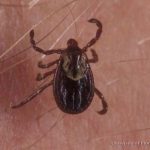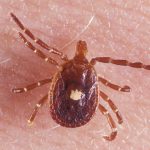You’ve probably heard some tips to prevent picking up ticks in the past, but did you ever wonder why some work and others don’t? Understanding the life cycle and behavior of common ticks can help you succeed with your prevention measures.
A general life cycle for ticks includes four life stages: egg, larva, nymph, and adult. The egg hatches into larva which require a blood meal to molt into a nymph which again requires a blood meal before molting to an adult.
The adult female also requires blood feeding in order to produce eggs, which she lays in high numbers – some species lay up to 6,500 eggs!
Because blood is required for development, ticks have to be resourceful in finding hosts. Knowing this can help you understand why some tips work better than others.
Tick Tips
-
Wear clothing that covers skin and avoid sitting on the ground or logs in brushy areas. Adult ticks exhibit a behavior called “questing” where they climb to the top of grasses and vegetation with their forelegs extended and wait for a host to come by. The American Dog Tick‘s primary host are dogs, but they will also target cattle, horses, and humans.
-
Apply repellents to exposed skin and clothing (different products are labeled for where they are applied, follow all directions). These chemicals repel ticks and can reduce likelihood of tick attachment, but ticks have been known to crawl over treated areas to access untreated body parts.
-
Keep grass and vegetation maintained and clean up debris that may harbor small mammals and rodents. Early in the tick life cycle it targets smaller animals for blood and they can
hide or shelter in debris piles and vegetation. -
Always shower and check yourself for ticks after being in areas where ticks may live, especially when temperatures are warm. Nymphs can be less than 1 mm long, so check carefully!
For instructions on how to properly remove a tick that has embedded, visit UF Health Tick Removal.
Latest posts by Julie McConnell (see all)
- How do flowers know when to bloom? - January 8, 2026
- Thinking of Starting a Cut Flower Business? Don’t miss out on Cut Flower 101! - October 30, 2025
- 2025 Gardening in the Panhandle LIVE! Great Southeast Pollinator Census – Bee a Citizen Scientist! Wrap Up - September 18, 2025




